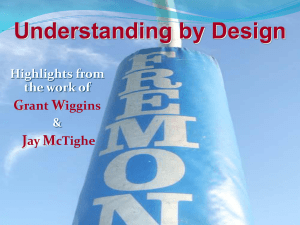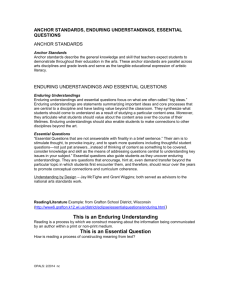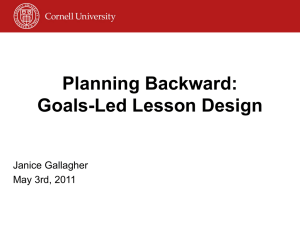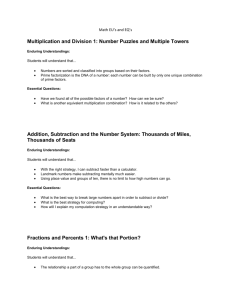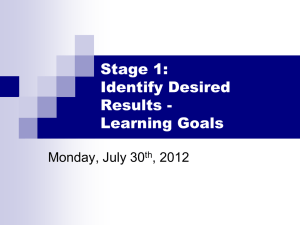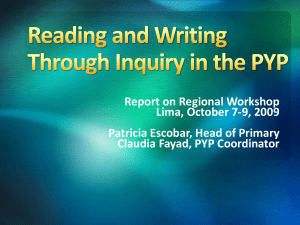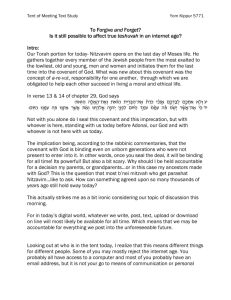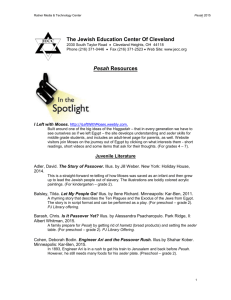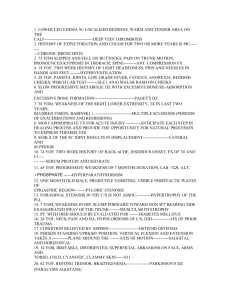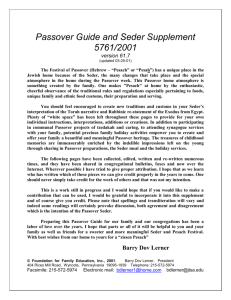Holiday – Haggim curriculum – 5th Grade Rosh Hashanah and Yom
advertisement
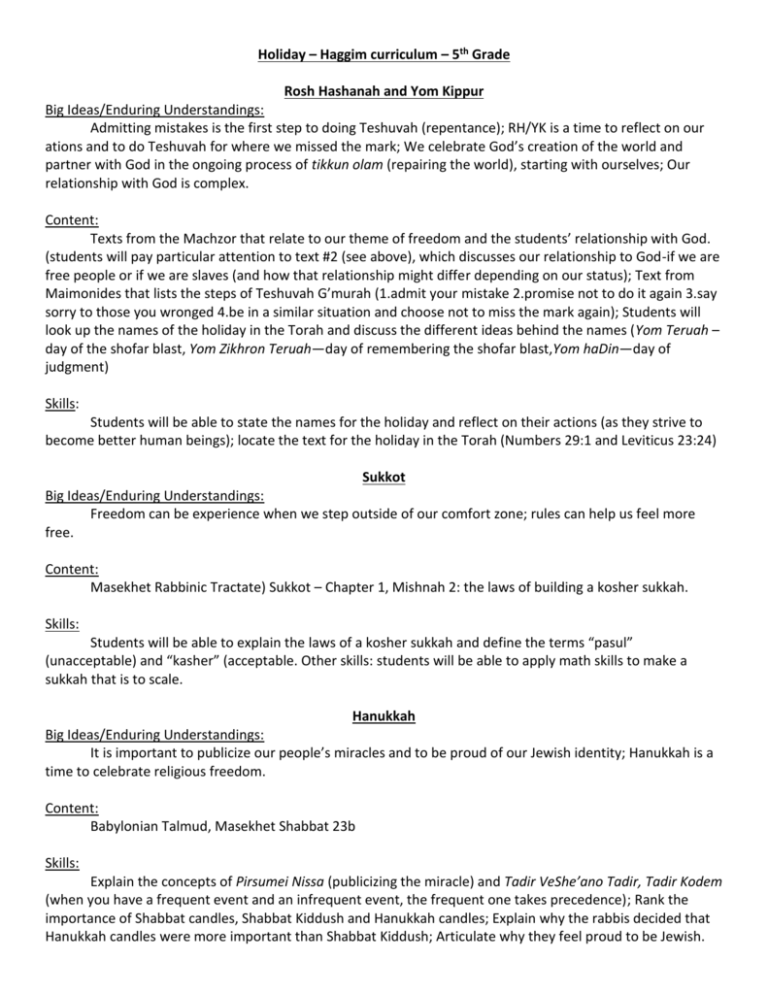
Holiday – Haggim curriculum – 5th Grade Rosh Hashanah and Yom Kippur Big Ideas/Enduring Understandings: Admitting mistakes is the first step to doing Teshuvah (repentance); RH/YK is a time to reflect on our ations and to do Teshuvah for where we missed the mark; We celebrate God’s creation of the world and partner with God in the ongoing process of tikkun olam (repairing the world), starting with ourselves; Our relationship with God is complex. Content: Texts from the Machzor that relate to our theme of freedom and the students’ relationship with God. (students will pay particular attention to text #2 (see above), which discusses our relationship to God-if we are free people or if we are slaves (and how that relationship might differ depending on our status); Text from Maimonides that lists the steps of Teshuvah G’murah (1.admit your mistake 2.promise not to do it again 3.say sorry to those you wronged 4.be in a similar situation and choose not to miss the mark again); Students will look up the names of the holiday in the Torah and discuss the different ideas behind the names (Yom Teruah – day of the shofar blast, Yom Zikhron Teruah—day of remembering the shofar blast,Yom haDin—day of judgment) Skills: Students will be able to state the names for the holiday and reflect on their actions (as they strive to become better human beings); locate the text for the holiday in the Torah (Numbers 29:1 and Leviticus 23:24) Sukkot Big Ideas/Enduring Understandings: Freedom can be experience when we step outside of our comfort zone; rules can help us feel more free. Content: Masekhet Rabbinic Tractate) Sukkot – Chapter 1, Mishnah 2: the laws of building a kosher sukkah. Skills: Students will be able to explain the laws of a kosher sukkah and define the terms “pasul” (unacceptable) and “kasher” (acceptable. Other skills: students will be able to apply math skills to make a sukkah that is to scale. Hanukkah Big Ideas/Enduring Understandings: It is important to publicize our people’s miracles and to be proud of our Jewish identity; Hanukkah is a time to celebrate religious freedom. Content: Babylonian Talmud, Masekhet Shabbat 23b Skills: Explain the concepts of Pirsumei Nissa (publicizing the miracle) and Tadir VeShe’ano Tadir, Tadir Kodem (when you have a frequent event and an infrequent event, the frequent one takes precedence); Rank the importance of Shabbat candles, Shabbat Kiddush and Hanukkah candles; Explain why the rabbis decided that Hanukkah candles were more important than Shabbat Kiddush; Articulate why they feel proud to be Jewish. Purim Big Ideas/Enduring Understandings: Freedom of religion, saving human life and preserving personal dignity are important values that may cause someone to endanger their life or status; we have the freedom to make a choice, even in difficult situations. Content: Students will study three sections from Megillat Esther (text in Hebrew with either vocabulary list or translation) and evaluate the actions of the main character in each section along these lines: Vashti—1:10-22 (the King asks Vashtito do something that she does not feel comfortable with and degrades her personal dignity); Mordechai—3:1-7 (Haman asks Mordechai to bow down to him and wants to deny Mordechai his religious freedom); Esther—4:13-17 (Esther decides to plead before the King, even though she risks her own life, for the sake of the Jewish people) Skills/students will be able to…: …read and translate the text from Hebrew to English; …demonstrate empathy for the characters in the story and analyze why they made the choices they did; …reflect on whether they would have made the same choices, if they were in the same position as the characters in the Megillah. Other skills: Students will be able to read Megillah to the whole school, chant with special Megillah trope (cantillation), recite the blessings before and after reading the Megillah. Pesach/Passover Big Ideas/Enduring Understandings: In every generation, we are supposed to see ourselves as if we left Egypt and re-experience the exodus from Egypt anew; freedom and change can be scary, but it is necessary for growth and maturation (as this holiday occurs in the spring when 5th graders are thinking about graduating from JCDS and attending new schools, this theme is particularly poignant); bringing about freedom and change take time and effort; the Passover seder is a ritual that unifies all Jews across the generations and geography; the seder is an opportunity to bring creativity and a constructivist approach to the traditional text. Content: The Exodus section of B’Shallah should coincide with the preparation for Passover learning. In the B’Shallah unit, students learn about: Pesah Mitzrayim (the laws of Passover as celebrated the one time, as the Israelites were leaving Egypt) vs. Pesah Dorot (the laws of Passover for future generations; Midrashim (Rabbinic legends) about splitting of the sea, which allows students to empathize with the Israelites who were leaving and may have felt scared; students prepare for whole school model seder by practicing their parts to read aloud, as well as a creative project. (In the past, students made pillows to recline on. They chose the design and wrote skits about the most important verses in the Exodus story to present at the model seder). Skills/students will be able to…: …empathize with the Israelites who left Egypt and apply their experience to their own lives; …review all the major events that led up to the Exodus and explain their role in bringing the Israelites freedom. Other skills: Students will be able to recite key passages from the Haggadah in Hebrew and explain their meaning; sing the key songs from the Haggadah. Yom Ha’Atzma’ut (Israel Independence day) Big Ideas/Enduring Understandings: Freedom is worth fighting for; Israel’s freedom allows all Jews to have a homeland; Yom Ha’Atzma’ut is a modern holiday that reflects a modern miracle. Content: This unit should coincide with the Lashon (Hebrew Language) unit, Lamah Da’ag HaHodesh HaHadash? (Why did the new holiday worry?) Skills: Students will be able to: explain how Yom Ha’Atzma’ut is similar to the other holidays; reflect on why the state of Israel is essential for the Jewish people’s freedom; sing the tefillah Avinu She’Bashamayim – the Prayer for the State of Israel. Shavuot (Festival of Weeks) Big Ideas/Enduring Understandings: Freedom comes with responsibility – laws are necessary to maintain and preserve freedom; Jews become completely free by serving God; our ancestors received important life lessons that they have passed down to us and that we will pass down to our children; Jews are connected through the generations by our laws and our values. Content: The Torah portion in Exodus, Yitro will be studied. Students will learn about the Israelites’ journey through the wilderness and their numerous complaints (Exodus ch. 17); Yitro’s suggestion to delegate leadership (Exodus ch. 18); the preparation for and the receiving of the 10 Commandments (chapters 19-20) Skills / Students will be able to…: …explain why laws are necessary to maintain and preserve freedom; explain the main customs of Shavuot.
